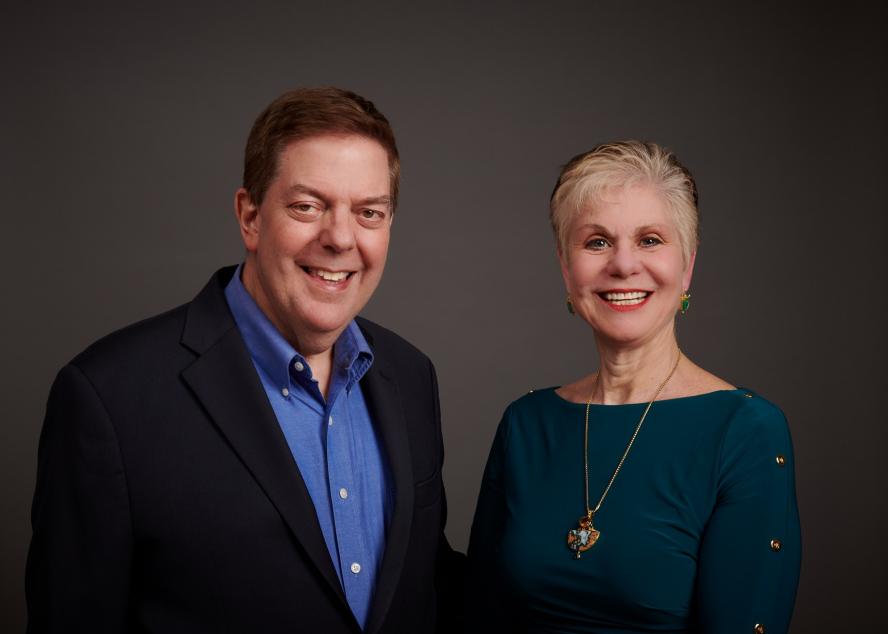-
About
- Departments & Offices
-
Academics
- Physician Assistant
- Special Master’s (MBS)
-
Admissions & Financial Aid
- Tuition & Fees
-
Student Life
-
Research
- Research Labs & Centers
-
Local & Global Engagement
- Global Health Programs
- Community Engagement
To Repair the World
A gift to the Community Service Learning Program, inspired by the Dezube family’s story of care and survival

Many charitable gifts are rooted in home and family, but for Bruce Dezube, M83, M15P and his wife, Esther Dezube, M15P, philanthropy is also an important way to celebrate the stories of those who came before us, as we build a more just and compassionate world.
The Dezube family’s roots in the Tufts community begin with Bruce, an oncologist and member of the Class of 1983. “I have very fond memories of Tufts,” he recalls. “They gave me great training.” His career has spanned more than 34 years: 24 in clinical practice at Beth Israel Deaconess Medical Center, and ten in the pharmaceutical industry. He believes that Tufts’ training remains one of the best in the nation. “It has the right combination of science and research to propel medicine forward, and a strong focus on primary and community care.” Bruce and Esther’s Tufts connections now include their son, Aaron Dezube, M15, a surgical resident at St. Elizabeth’s Hospital who is presently doing research at Brigham and Women’s Hospital, and their daughter-in-law, Jessica Dezube, D15, a graduate of Tufts University School of Dental Medicine. After several years of supporting Community Service Learning (CSL), in honor of Esther’s parents, Norman and Amalie Salsitz, both Holocaust survivors who emigrated to the U.S. from their native Poland, Bruce and Esther decided to expand the impact of their philanthropy by creating an endowed fund in support of CSL in perpetuity through our students.
The CSL program is an innovative partnership between the medical school and Tufts’ Jonathan M. Tisch College of Civic Life, and one of the first programs at an American medical school to integrate community service into the core MD curriculum. Through CSL, all medical students spend 50 hours or more working directly in the community as collaborators, mentors, and health educators. CSL projects include the Sharewood Project, KICKS! at the Floating Hospital, partnerships in Boston’s Chinatown community, and a variety of other patient and health advocacy initiatives. Through these first-hand experiences, MD students gain a deeper understanding of the health disparities that impact patients and communities, and build vital skills in communication, teamwork and clinical care.
Those values are also part of Esther’s parents’ story of survival, against incredible odds, during the Holocaust. Throughout Esther’s childhood, her father shared stories of the war with his daughter, and for Esther, one story in particular reflects the spirit of their gift. During the war, Norman escaped a Nazi labor camp along with several other Jewish prisoners, and the escapees found refuge at the farm of a non-Jewish, Polish family. Norman was suffering from a badly infected gunshot wound and the family brought him to a local doctor for treatment. Harboring or providing medical care to Jews was forbidden, but the family and the doctor who treated Norman, risked their lives to help him. “My father was saved,” says Esther, and went on to save other lives as part of the Jewish Resistance Underground, through which he also met Amalie, his future wife. The care he received, says Esther, was “community outreach” in the truest sense, and this made a gift to the CSL program a fitting way to honor her parents.
CSL Program Coordinator Jennifer Greer-Morrissey, Ed.M. says that the gift will bring new capacity and energy to this growing program. “The Dezube gift augments our ability to support existing projects while also enabling us to seed-fund the new and innovative ideas from our students. This makes Bruce and Esther’s generosity doubly impactful, because it benefits the community and our students, by nurturing their growth as physician-leaders committed to the public good."
Bruce believes these skills are essential to the future success of Tufts medical students. No matter what one’s area of practice, he says, “if you want to do community work, you really have to understand the community.” That includes everything from the physician’s cultural competencies, to the clinic’s location, and “even the artwork on the walls.” All of these elements can help patients feel welcomed, and understood. Beyond helping medical students build cultural competency, he adds, programs like CSL can help medical students who are from populations underrepresented in medicine to feel more fully included in the profession, and encourage them to view their experience and background as assets in patient care.
Just as their loved ones are a source of inspiration, the Dezube’s Jewish faith, and the concept of tikkun olam, which means “repair the world,” in Hebrew, shapes their philanthropy. Esther hopes their most recent gift will help the CSL program achieve “a domino effect” for community health, by educating and supporting one person at a time. Health information, and the empowerment that comes with it, she says, can be a shared resource, in a family, a neighborhood and a community. Tufts medical school is grateful for the Dezube’s generous partnership, and their gift to the CSL program—a celebration of health, community, and the power of the human spirit.